Revealed: 9 Most Important Brain Food For Kids
You asked and I listened. Here’s a simple list of brain food for kids. You might be surprised what’s revealed.
As parents, we all want to give our children the best start in life, so you are probably looking for examples of the best brain food for kids.
After all, the brain is the control centre of the body and requires a steady supply of nutrients to function optimally.
One way to support their growth and development is by providing them with a healthy, balanced diet that includes plenty of brain-boosting foods.
In this article, we’ll explore the best brain food for kids and how they can benefit your child’s brain health and cognitive function.
From leafy greens to fatty fish, there are plenty of tasty and nutritious options that you can incorporate into your child’s diet to help support their brain development.
So, let’s dive in and discover the top brain-boosting foods for your little ones!
Top Brain Food For Kids
- Breastmilk
- Walnuts
- Mushrooms
- Oily fish
- Tofu
- Blueberries
- Spinach
- Beans and lentils
- Sweet potato
The role of nutrition in brain development
Recent research indicates a strong correlation between maternal diet, infant nutrition, and brain development.
Providing your child with these brain foods is just the beginning.
As your child begins school, it becomes even more crucial to consider their nutrition to support their ongoing development and learning.
The brain requires a constant supply of energy, which comes from the food children eat.
So to help you with your weekly menu planning, you’ll find 9 brain foods for kids to include as part of a balanced diet.
Obviously, this list of brain food for kids is just a start.
Several key nutrients are crucial to support the normal development of the brain including proteins, carbohydrates, healthy fats, vitamins and minerals.
Baby brain foods to fuel brain development
Nutrition is specifically important for babies and growing toddlers up to 3 years of age.
When I think of the baby’s developing brain, nutrients like omega-3 fatty acids and iodine immediately come to mind.
However, the following nutrients are equally important to fuel normal brain development:
- protein (building and repairing brain cells)
- carbohydrates (is the brain’s primary source of energy and without it, children will feel tired and have difficulty concentrating).
- iron (key role in normal brain development as it helps carry oxygen to the brain). Iron deficiency can cause tiredness and fatigue in children.
- zinc (has a role in signalling chemical messages in the brain and can influence learning, attention, memory and mood)
- iodine (supports thyroid hormone synthesis in the thyroid glands). Iodine deficiency has been linked with impaired hearing, speech, gait and IQ points.
- B vitamins (vitamins B6, B9 and B12 are important for brain function. Vitamin B12 with iron helps produce neurotransmitters and has a role in the areas of learning and memory).
- Healthy fats (such as omega-3 fatty acids) are also crucial for brain development, as they help to form the protective coating around brain cells that allows for the proper transmission of electrical signals.
Does diet influence brain function?
As described above, diet certainly can influence brain function.
A growing baby will need to meet their daily requirements of the above nutrients to prevent deficiency so that children can continue to grow and thrive.
When children don’t get enough of the most important brain nutrients, it can begin to affect some aspects of brain function.
For example, in the early years, foods rich in iron are important examples of brain foods for kids, because it helps to support normal cognitive development and IQ scores.
Iron also helps with muscle development and therefore supports normal physical growth in babies and toddlers.
Iron-rich foods are lentils, red meat and green leafy vegetables to list a few.

Healthy brain foods for kids
Breastmilk
Right from the word go nature have your kids covered with the power of omega-3 fatty acids in breast milk.
Why breastmilk? It is naturally enriched with essential fats called docosahexaenoic acid (DHA) and eicosapentaenoic acid (EPA), in the perfect ratio to promote good growth.
DHA and EPA are types of long-chain fats which are really important for your baby and toddler’s normal brain, nerve and eye development.
What’s intriguing is that during the last trimester of pregnancy and until your toddler reaches two years of age, DHA accumulates in the eye and brain.
These early years are thought to be a period of significant and rapid brain growth.
During these golden years, you can help your toddler reach optimal levels of DHA through breastmilk or DHA-enriched formula and then solids.
Store-bought infant formula now has omega-3 fats added but amounts can vary.
Remember that levels also vary in breastmilk and are dependent on the amount that mum eats.
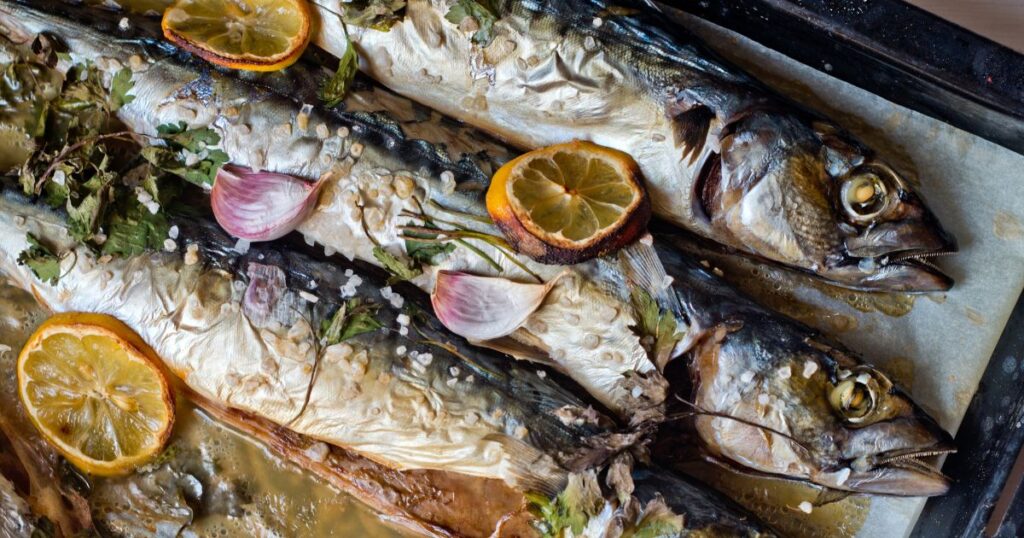
Oily Fish
A brilliant brain food for kids that literally ticks all the boxes. A source of protein, B vitamins, selenium and zinc, oily fish is the only food that is abundant in DHA.
You may not think of fish as a complementary food to breastfeeding but it’s a great choice. Include it as early as 6-7 months once your baby has started solids and successfully weaned to fruit and vegetables.

What about children with Attention Deficit Hyperactivity Disorder?
Research suggests that children with ADHD are not eating their weekly target of two portions of fish per week. As a result, their blood levels of omega-3 fats are lower compared to children who do.
Does it matter? The results are mixed but children who have higher blood levels of omega-3 fats may have improved symptoms.
As adults, eating oily fish may reduce your risk of cardiovascular disease via lowered blood pressure and reduced build-up of fat in your arteries.
For more on fish see A Fishy Bite – Should Your Kids Be Eating Fish?
Are all omega-3 fats the same?
If children really cannot bear to eat fish, then include plant sources of this super fat.
They do not contain DHA that is naturally present in fish, but plant sources of parent omega-3 fats can be converted to DHA to a small extent by the body.
For more read your top five fats for healthy kids.
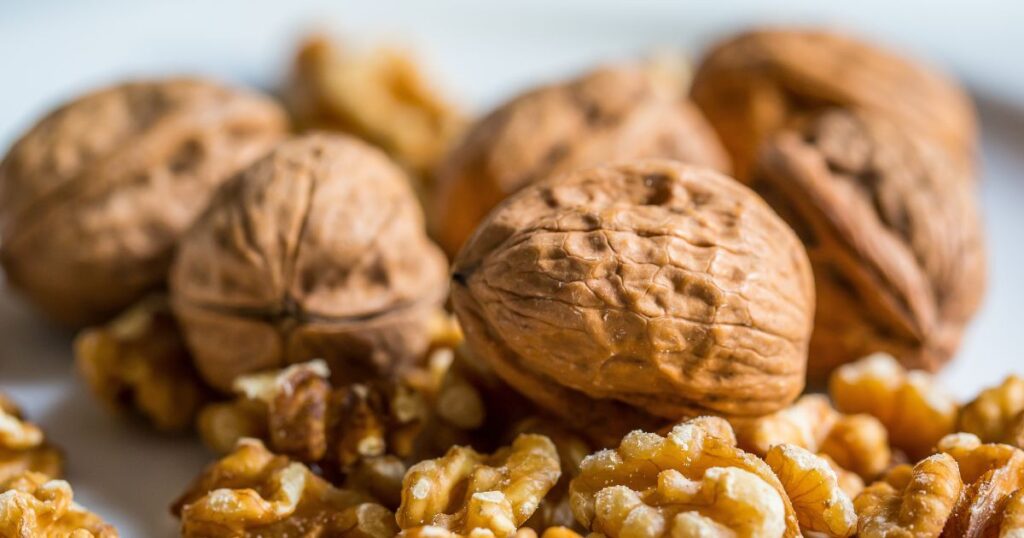
Walnuts
Looking for the perfect brain food for your little ones?
Look no further than walnuts!
Not only do they have a unique blend of polyunsaturated fats that are great for cognitive function, but they’re also incredibly versatile.
However, it’s important to note that children under five should not be given whole nuts due to the risk of choking.
But, don’t worry! You can easily incorporate walnuts into your child’s diet by grinding them into a powder or drizzling walnut oil onto salads and dips.
And if you’re feeling extra adventurous, try using ground walnuts as a healthy and delicious ingredient in baked goods.
While nuts can be pricey, they’re worth it as just a few pieces go a long way thanks to their high energy and fat content.

Tofu
Don’t be scared of tofu, it’s a fantastic protein source and a friend to your child’s brain!
Not only is it loaded with essential amino acids, but it’s also high in tyrosine, a key building block for dopamine and norepinephrine.
These neurotransmitters play a big role in mood and energy, so eating tofu can help keep your little one feeling happy and focused.
There are plenty of tasty ways to incorporate it into your child’s diet too – try crumbling it into egg-free baking or adding it to a stir-fry for some extra calcium and iron.
And if your kids are noodle fans, why not give them an Asian-style dish with lightly fried tofu?
You can even use it in a scrumptious lasagna. Give it a go and you might be surprised by how much your family loves this brain-boosting superfood!
Why not try a satay sauce with tofu?
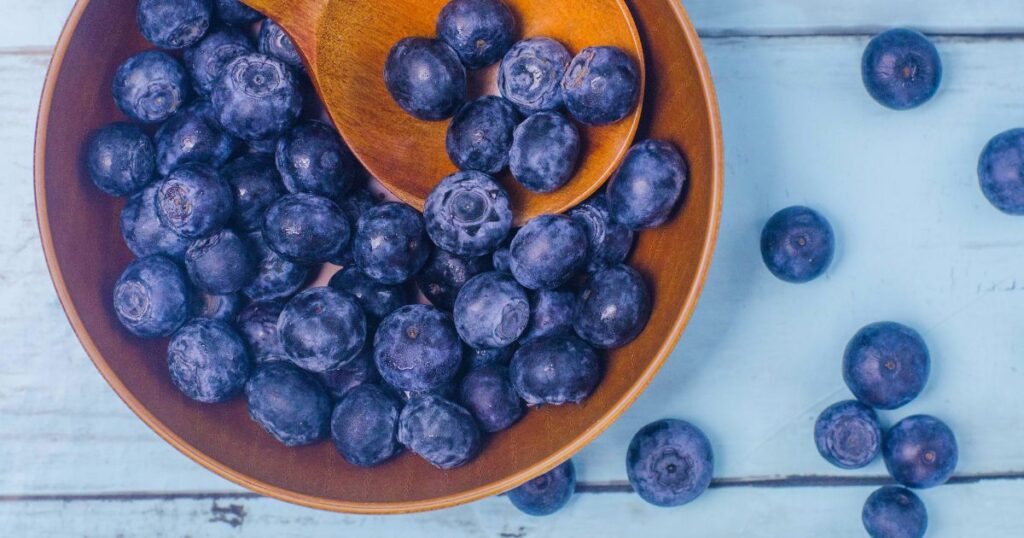
Blueberries
When it comes to brain-boosting foods for kids, blueberries may not have an overwhelming amount of scientific evidence to back up their benefits.
However, they are still a fantastic choice for a healthy snack.
Not only are they low in calories, but they are also loaded with fibre and powerful antioxidants like phenolic compounds.
Want to make them a part of your child’s diet?
Try adding frozen blueberries to smoothies and breakfast cereals for a fun and nutritious purple pop of flavour that your kids will love!
This is one easy brain food for kids that the whole family will love!
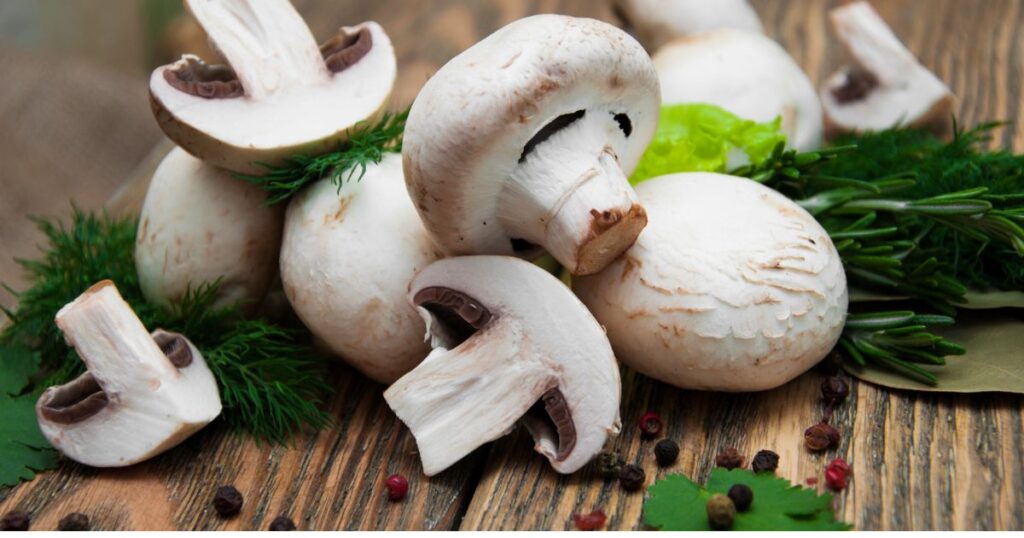
Mushrooms
Mushrooms are an affordable and convenient source of the mineral selenium, which supports various functions of the central nervous system, including coordination, memory, and cognition.
While brazil nuts are the richest source of selenium, mushrooms are an everyday option that is packed with this trace mineral.
You can use wild or common mushrooms in a variety of dishes, such as stir-fries, curries, casseroles, risotto, or soup to provide your child with this nutrient-dense brain food.
Incorporating mushrooms into your child’s diet is a simple and effective way to boost their brain health.
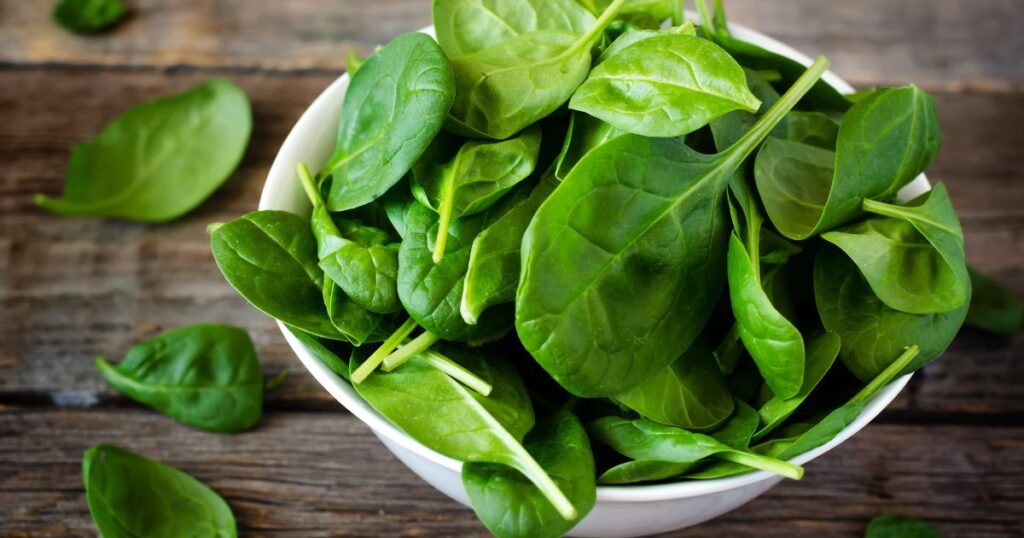
Spinach
If you are wondering how this leafy green made into the list of brain-boosting foods for kids, Popeye the Sailor was onto it when he indulged in this green stuff.
He may have originally thought that it had ten times more iron than it truly did, but spinach is still a valuable source of iron.
Spinach is not only rich in iron, but it is also a great source of vitamins and minerals like:
These nutrients are essential for the normal development of the brain.
Including spinach in your child’s diet can assist their cognitive performance, improve their memory and attention span and promote overall brain health.
Add spinach to your child’s meals in the form of salads, soups, smoothies, or stir-fries to ensure they get the essential nutrients they need for optimal brain function.
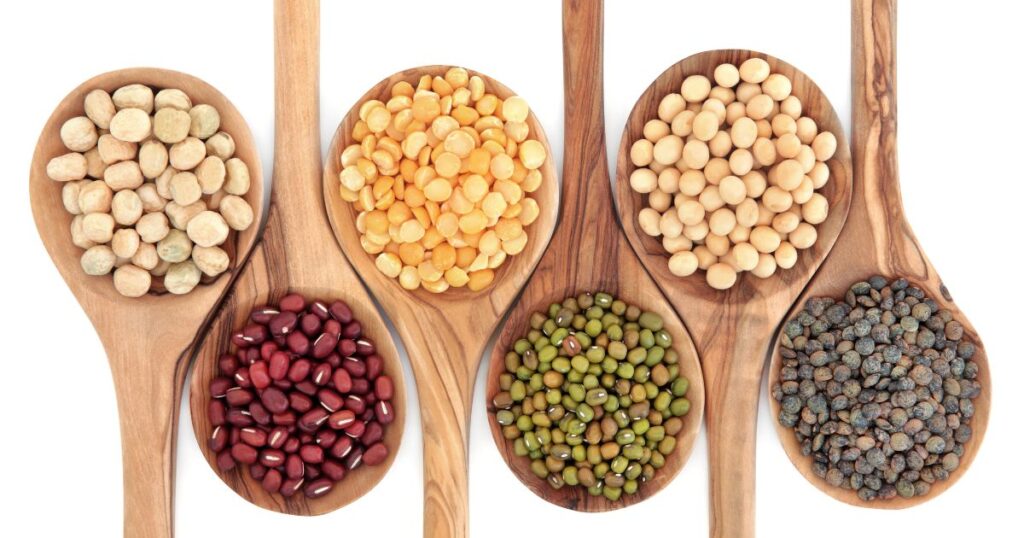
Dried Beans, Peas & Lentils
Zinc is a nutrient that’s not only essential for healing wounds but also critical for brain development.
Studies have shown that it plays a role in learning and memory, making it a must-have in your child’s brain food diet.
One easy way to boost your child’s zinc intake is to add half a cup of soaked beans, peas, or lentils to every meaty dish.
You can also make a delicious and nutritious pilaf by mixing rice with veggies, herbs, and mild spices.
Look for savoury rice and bean-based dishes for a tasty and easy way to load up on this brain-boosting nutrient.

Sweet potato
Finally, but not least a vitamin close to my heart. I have researched the link between blood levels of vitamin A and calcium in children with the renal disease with its findings published here.
Vitamin A is a vital nutrient for kids as it plays a crucial role in normal vision, skin health, and a strong immune system.
But did you know that vitamin A can also aid in learning and memory by facilitating brain cell communication?
To get a feast of vitamin A in every bite, try swapping out regular potatoes for sweet potato mash or chips.
Sweet potatoes are exceptionally high in this fat-soluble vitamin, making them an easy and delicious brain-boosting food for kids.
Other ways of increasing vitamin A-rich foods to increase your child’s concentration, learning and healthy brain development is by incorporating orange, red, and green coloured fruits and vegetables.
So, let’s keep it simple and make the right choices for our kids’ brains!
Best brain-boosting nutrients for kids
This article highlighted some of the key nutrients that are essential for the normal development of the baby’s brain.
You also discovered top brain foods for kids that are rich in these nutrients.
The nutrients discussed included omega-3 fatty acids, iron, zinc, choline, vitamin D, and B vitamins.
The article also provided tips on how to incorporate these brain-boosting foods into children’s diets and emphasised the importance of a balanced and varied diet for optimal brain health.
I hope this article has been a useful guide to giving your children the best possible nutrition for optimal brain development and function.









